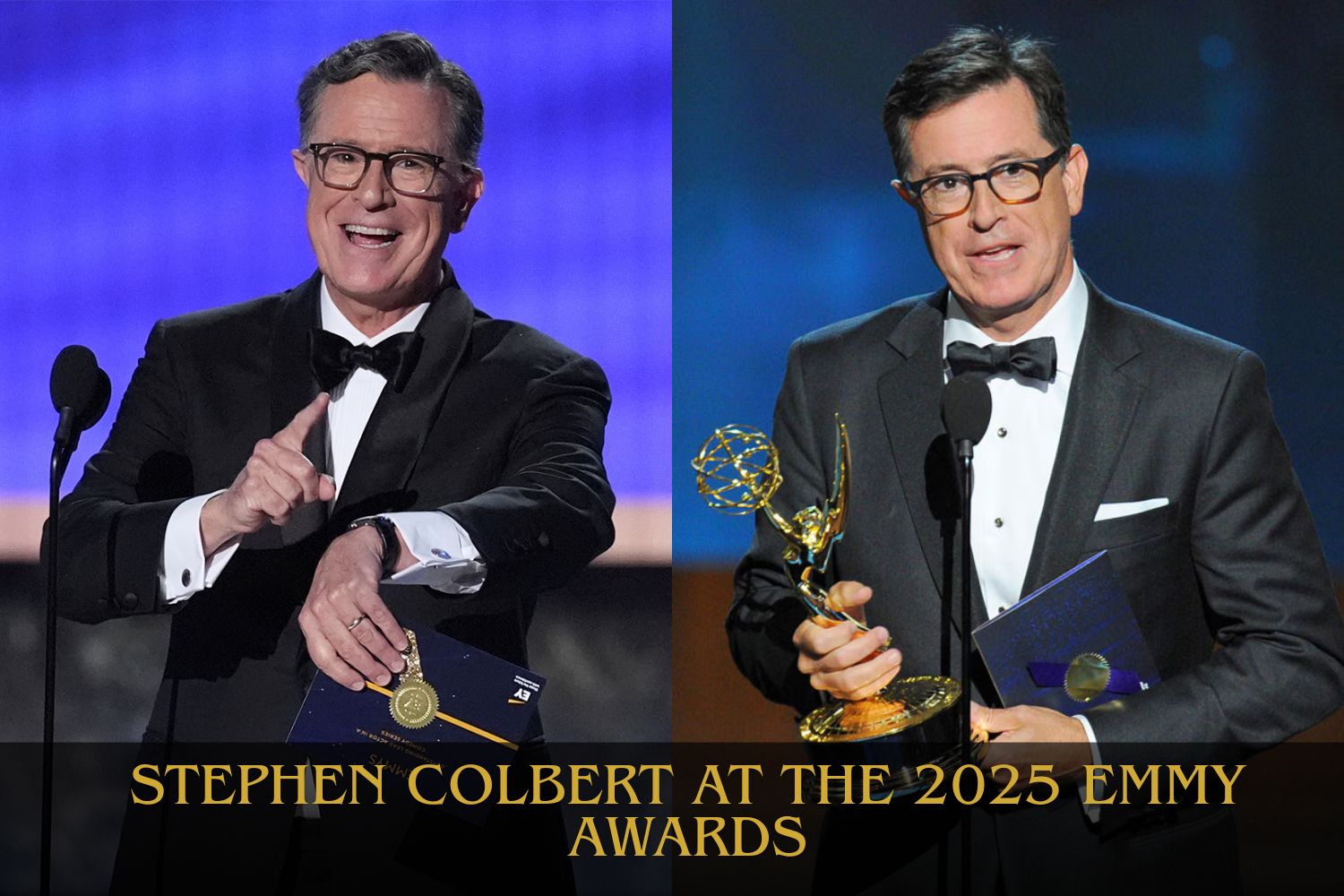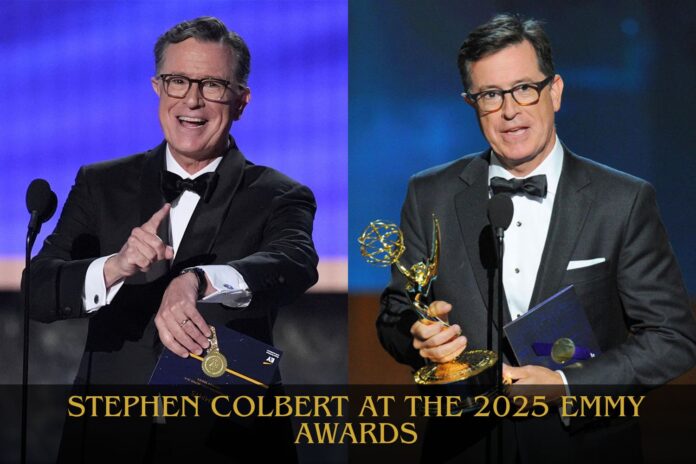🚨 Stephen Colbert’s Emmy Triumph Amid CBS Chaos: The Late Show might be facing the axe, but Stephen Colbert just stole the 2025 Emmys with a fake résumé that had Hollywood howling—then brought them to tears with a raw thank-you to his 200-strong crew. 😅😢 A standing ovation that shook the theater… but is it a farewell or a defiant new chapter? The moment that’s got everyone buzzing—tap the link in bio for the full, heart-tugging clip that’s rewriting late-night’s legacy!

Stephen Colbert has always been the guy who could make you laugh through the pain, turning awkward moments into gold. But on September 14, 2025, at the 77th Primetime Emmy Awards held at the Peacock Theater in Los Angeles, he flipped the script in a way that left the audience—and probably a few million viewers at home—wiping away tears mixed with chuckles. Just months after CBS dropped the bombshell that “The Late Show with Stephen Colbert” would be canceled, the host walked out to a full standing ovation, joked about his job prospects with a hilariously outdated resume, and then delivered an acceptance speech for his show’s first-ever Emmy win that hit like a gut punch of gratitude and reflection. It was a night that encapsulated the highs and lows of late-night television, reminding everyone why Colbert has been a fixture in American comedy for nearly two decades.
To understand the weight of that moment, you have to rewind to July 17, 2025, when Colbert broke the news himself during a taping of his show. “The Late Show,” which had been a CBS staple since he took over from David Letterman in 2015, was set to wrap up in May 2026. The franchise, which started back in 1993, would end after 33 years. CBS was quick to frame it as a “purely financial decision” in a challenging late-night landscape, where ad revenues are tanking and streaming is king. George Cheeks, the president of CBS and co-CEO of Paramount Global, later elaborated at a press conference after the Skydance merger closed, saying the advertising market for late-night shows is in “significant secular decline.” They pointed to the end of shows like “After Midnight” earlier in the year as part of a broader strategy to focus on primetime and sports content.
But the timing raised eyebrows. The announcement came just days after Paramount settled a $16 million lawsuit with President Donald Trump over alleged “deceptive editing” in a “60 Minutes” interview with Kamala Harris. Colbert, never one to shy away from politics, had ripped into the settlement on his show, calling it a “big fat bribe” to smooth the path for the $8.4 billion Paramount-Skydance merger, which needed Trump’s administration approval. Critics, including lawmakers and fellow late-night hosts like Jimmy Kimmel, speculated that Colbert’s sharp tongue—especially his long history of skewering Trump—might have played a role. Kimmel even posted on Instagram: “Love you, Stephen. Fuck you and all your Sheldons, CBS,” referencing the network’s reliance on reruns of “Young Sheldon” for revenue. Petitions circulated online, urging CBS to reconsider, and Colbert’s team reportedly learned of the potential axing around July 4, with internal estimates suggesting the show was losing about $40 million annually—though some sources called that figure inflated.
Despite the controversy, “The Late Show” had been killing it in the ratings. For nine straight seasons, it was the highest-rated late-night program, outpacing competitors like “The Tonight Show Starring Jimmy Fallon” and “Jimmy Kimmel Live!” in total viewers and the key 18-49 demographic. In 2025 alone, it averaged 2.417 million viewers per new episode, even gaining ground while others slipped. Colbert’s blend of satirical monologues, celebrity interviews, and musical bits had evolved from his earlier days on “The Colbert Report,” where he perfected the blowhard conservative persona that won him a cult following. By the time he landed at CBS, he had already snagged 10 Emmys for his previous work, plus Grammys, Peabodys, and more. The show wasn’t just entertainment; it was a cultural touchstone, especially during turbulent times like the COVID-19 pandemic, when Colbert’s remote broadcasts from his house kept the conversation going.
Fast-forward to the Emmys, broadcast live on CBS—yes, the same network that canned his show. The evening was hosted by comedian Nate Bargatze, but it was Colbert who stole the thunder right from the opening moments. As the first presenter for the Outstanding Lead Actor in a Comedy Series category, he stepped onto the stage alongside Harrison Ford, and the room exploded. The audience, packed with Hollywood’s elite, rose to their feet in a spontaneous standing ovation, chanting “Stephen! Stephen!” It was a raw show of solidarity, a middle finger to the executives who pulled the plug. Colbert, ever the pro, leaned into it with self-deprecating humor. “While I have your attention: Is anyone hiring?” he quipped, pulling out a crumpled resume and a vintage headshot from his teenage years. “I haven’t had a chance to update my headshot in a bit, but I think it still works. I’m in there somewhere—after I get back from Istanbul, I’m sure.” He handed the resume to Ford, asking him to pass it along to Steven Spielberg, before pivoting to present the award (which went to Jeremy Allen White for “The Bear”).
The crowd ate it up, laughing and applauding even harder. It was classic Colbert: turning vulnerability into comedy without missing a beat. But the real emotion came later, when “The Late Show” was announced as the winner for Outstanding Talk Series, beating out “The Daily Show” and “Jimmy Kimmel Live!” This was the show’s first Primetime Emmy in that category after 10 seasons, a poetic capstone just seven months before its end. Colbert returned to the stage, fist-pumping and letting out a big “Woo!” as the ovation swelled again, this time with name chants echoing through the theater.
In his acceptance speech, Colbert got real. He thanked the roughly 200 “incredible professionals” behind the scenes—the writers, producers, crew—who had kept the show alive for nearly a decade. “Sometimes, you only know how much you love something when you get a sense you might be losing it,” he said, his voice cracking with emotion. He reflected on the show’s origins, how he set out to make a late-night series about “love” but realized it was really about “loss.” Tying it to broader themes, he added, “Ten years later, in September of 2025, my friends, I have never loved my country more desperately. God bless America.” He closed with a paraphrase of Prince’s “Let’s Go Crazy”: “Stay strong and be brave, and if the elevator tries to bring you down, go crazy and punch a higher floor!” It was a moment that blended humor, heartbreak, and hope, leaving the audience—and likely Colbert himself—visibly moved.
Colbert didn’t stop at thanking his team; he surprisingly extended gratitude to CBS. “I want to thank CBS for giving us the privilege of being part of the late-night tradition, which I hope continues long after we’re no longer doing this show,” he said. It was a classy move, avoiding direct criticism on the network’s airwaves, though insiders noted the irony. He also choked up while honoring Amy Cole, a longtime colleague who had worked with him since “The Colbert Report” and passed away earlier that year. “Amy, this is for you,” he said, crediting her as a key part of the show’s success. Cole’s contributions, from production to personal support, had been invaluable, and the tribute added another layer of poignancy to the night.
The Emmys moment wasn’t just a personal win for Colbert; it highlighted the precarious state of late-night TV. The format, once dominated by giants like Johnny Carson and Letterman, is fading in the streaming era. Younger audiences turn to TikTok clips and podcasts for their comedy fixes, and traditional ad dollars aren’t flowing like they used to. CBS’s decision, while framed as economic, sparked debates about censorship and corporate influence. MSNBC columnist Jacques Berlinerblau called it a “warning signal” for comedy’s future, suggesting that Colbert’s bold political takes—especially anti-Trump jabs—might have made him a target. Even Reddit threads buzzed with theories, from financial woes to outright retaliation. On X (formerly Twitter), posts about the ovation went viral, with users sharing clips and praising Colbert’s resilience. One tweet from a fan account captured it perfectly: “Stephen Colbert Gets STANDING OVATION At 2025 Emmys After Show Cancellation,” linking to videos that racked up millions of views.
Colbert’s career trajectory makes this chapter all the more bittersweet. Born in 1964 in Washington, D.C., he grew up in South Carolina and honed his satirical edge at Northwestern University. His breakthrough came with “The Daily Show” in the early 2000s, where he served as a correspondent before spinning off “The Colbert Report” in 2005. That show, with its faux-conservative schtick, earned him widespread acclaim and a spot in the zeitgeist. When Letterman retired, CBS courted him aggressively, and “The Late Show” debuted to mixed reviews but quickly found its footing. Highlights included interviewing every living U.S. president (except Trump after 2016), viral bits like the “Late Show” band performing with celebrities, and Colbert’s emotional coverage of events like the 2020 election and the pandemic.
Through it all, Colbert’s personal life has grounded him. Married to Evelyn McGee-Colbert since 1993, with whom he has three children, he’s spoken openly about tragedies like the 1974 fire that killed his father and two brothers. That loss shaped his worldview, infusing his comedy with empathy. In interviews post-Emmys, he told reporters he’s not dwelling on the future: “I want to land this plane,” meaning focus on wrapping up the show strong. Rumors swirl about podcasts, books, or even a return to “The Daily Show,” but Colbert’s keeping it close to the vest.
The 2025 Emmys themselves were a mixed bag. Hosted by Bargatze, the show honored standouts like “The Bear” and “Hacks,” with reunions from “Gilmore Girls” and passionate speeches from winners like Cristin Milioti. But Colbert’s segments were the talk of the after-parties. Variety called his victory speech “electrifying,” while Rolling Stone said he “salvaged” the night, turning it into a “humiliation” for CBS. On X, reactions ranged from supportive (“This is why we love him!”) to snarky (“Look at all the Satan Worshipers” from one detractor), but the overwhelming sentiment was admiration.
As “The Late Show” counts down its final episodes, Colbert’s Emmy triumph feels like a fitting send-off. It wasn’t just about the award; it was a celebration of the team, the fans, and the power of comedy in dark times. Late-night may be evolving, but moments like this prove its heart beats on. Whether Colbert lands on another network, goes digital, or takes a well-deserved break, one thing’s clear: the ovation he got wasn’t just polite applause. It was a roar of appreciation for a man who’s made us laugh, think, and yes, sometimes cry—through it all.
